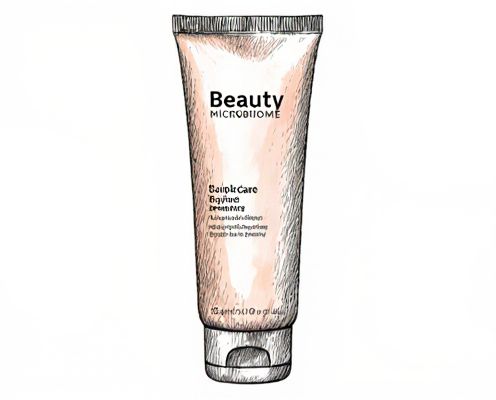
Microbiome skincare Illustration
Microbiome skincare harnesses the power of beneficial bacteria to restore balance and improve skin health. By supporting the skin's natural ecosystem, these products reduce inflammation, strengthen the barrier, and enhance hydration. Using microbiome-friendly ingredients promotes a radiant, resilient complexion while minimizing irritation and sensitivity.
Understanding the Skin Microbiome: The Foundation of Beauty
Understanding the skin microbiome is crucial for maintaining a balanced and healthy complexion, as it consists of trillions of beneficial microorganisms that protect against harmful pathogens and support skin barrier function. Your skin's natural microbiome regulates moisture levels, reduces inflammation, and promotes the healing process, forming the foundation of radiant beauty. Incorporating microbiome-friendly skincare products helps nurture these microorganisms, enhancing your skin's resilience and overall appearance.
How Microbiome Skincare Supports Healthy, Radiant Skin
Microbiome skincare harnesses the power of beneficial bacteria to restore and maintain the skin's natural balance, enhancing its barrier function and hydration. Products rich in prebiotics, probiotics, and postbiotics promote a diverse microbial ecosystem that protects against harmful pathogens and reduces inflammation. This approach supports radiant, healthy skin by improving texture, reducing sensitivity, and boosting overall skin resilience.
Top Benefits of Microbiome Skincare for Women
Microbiome skincare enhances skin barrier function, promoting hydration and reducing sensitivity by balancing beneficial bacteria. It supports natural defense mechanisms against environmental stressors and inflammation, leading to clearer, more resilient skin. Regular use of microbiome-friendly products helps maintain healthy pH levels and prevents acne, eczema, and premature aging for women.
Key Ingredients to Look for in Microbiome-Friendly Beauty Products
Prebiotics such as inulin and fructooligosaccharides nourish beneficial skin bacteria, promoting a balanced microbiome and healthy skin barrier. Probiotics like Lactobacillus and Bifidobacterium strains introduce live microorganisms that help reduce inflammation and improve skin hydration. Postbiotics, including bacterial lysates and fermentation extracts, support skin repair and enhance microbial diversity, optimizing skin resilience and radiance.
Prebiotics, Probiotics, and Postbiotics: What’s the Difference?
Prebiotics are non-digestible fibers that nourish beneficial skin bacteria, enhancing the microbiome's balance and promoting a healthy complexion. Probiotics consist of live beneficial microorganisms applied topically to reinforce the skin's natural barrier and reduce inflammation. Postbiotics are metabolic byproducts from probiotics that support skin hydration, soothe irritation, and strengthen microbial defense mechanisms.
How to Choose the Best Microbiome Skincare Products
Selecting the best microbiome skincare products requires analyzing ingredients that support the skin's natural flora, such as prebiotics, probiotics, and postbiotics known for balancing and nurturing beneficial microbes. Prioritize products free from harsh chemicals, synthetic fragrances, and preservatives that can disrupt microbiome health and cause irritation. Look for dermatologically tested, pH-balanced formulations that strengthen the skin barrier and promote resilience against environmental stressors.
Microbiome Skincare for Sensitive and Acne-Prone Skin
Microbiome skincare for sensitive and acne-prone skin harnesses beneficial bacteria to restore the skin's natural balance, reduce inflammation, and strengthen the protective barrier. Products enriched with prebiotics, probiotics, and postbiotics help calm redness, minimize breakouts, and promote faster skin healing without harsh chemicals. Clinical studies show that microbiome-friendly formulations improve skin resilience and support long-term clarity and hydration.
Clean Beauty Trends: The Rise of Microbiome-Focused Formulas
Microbiome skincare harnesses the power of beneficial bacteria to restore and maintain the skin's natural ecosystem, promoting healthier, balanced skin. Clean beauty trends emphasize microbiome-focused formulas that avoid harsh chemicals, sulfates, and synthetic fragrances, ensuring gentle yet effective care. These products boost the skin's resilience, reduce inflammation, and support long-term skin health by nurturing its microbiota.
Common Myths and Facts About Microbiome Skincare
Microbiome skincare supports the skin's natural balance by nurturing beneficial bacteria, contrary to the myth that all bacteria are harmful. Research shows that harsh cleansers and overuse of antibacterial products can disrupt the skin microbiome, leading to irritation and increased vulnerability to infections. Effective microbiome-friendly skincare products use prebiotics, probiotics, and postbiotics to maintain skin health and improve hydration, reducing signs of inflammation and sensitivity.
Expert Tips for Incorporating Microbiome Skincare Into Your Routine
Incorporate microbiome skincare by choosing products with prebiotics and probiotics that support your skin's natural flora balance. Maintain a gentle cleansing routine to avoid disrupting the microbiome, enhancing skin barrier function and reducing inflammation. You should apply these targeted treatments consistently, especially after cleansing, to promote healthier, glowing skin through balanced microbial ecosystems.
 womendy.com
womendy.com